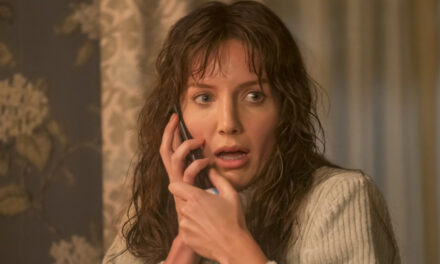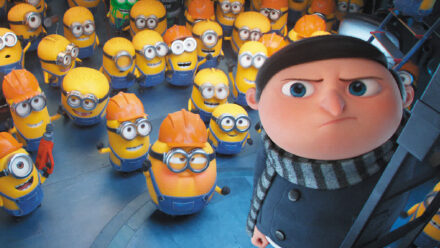
Filmmaker James Wan, the director behind such spookfests as Insidious and The Conjuring 1 and 2, may only serve as producer on the fright film Lights Out, but his handprints are all over it. This is a horror film filled to the brim with disturbing imagery in the vein of Wan’s most notable efforts in the horror genre. As such it comes as no surprise that Wan’s considerable clout was one of the deciding factors in the decision to greenlight the film, a micro budgeted affair that has the potential to return much of the modest budget to its financiers and then some. Should it catch on then audiences will surely love it if the screening I attended is any indication. For those of us like myself who have seen more of these films than the average moviegoer, well that’s another story.
Lights Out is based on a short film, also helmed by the same director, David Sandberg, and it’s easy to see why Wan would see potential in turning the short into a full-fledged feature film. The idea behind the film’s plot is pretty simplistic and introduced in the film’s opening scene. A woman, walking through a warehouse at the end of a workday, spies a dark figure when she turns the lights out. Each time she turns the lights off and on the figure gets closer and closer. Her boss bites the dust and then the film’s focus—and the bulk of the story—turns to his stepdaughter, Rebecca (Teresa Palmer) and her younger brother (Gabriel Bateman).
Rebecca’s younger brother has been having trouble staying awake at school, mainly because he’s afraid to go to sleep after having been visited nocturnally by the shadowy figure that took out his stepfather. Rebecca takes the boy to live with her until she can sort things out and then begins to discover that their mother (Maria Bello) may have had a personal connection to the figure that’s been terrorizing the boy.
What makes Lights Out stand out is that its quotient of fake scares is fairly small. Most of the ones that transpire here are of the real variety or as real as they can possibly be in the context of a horror film such as this one.
If I were to lodge a complaint against the film it would be that it does overexplain things from time to time and there is a faint feeling of been there, done that, hanging over the proceedings. Still, why carp? Lights Out delivers enough scares that most audiences won’t even care if they have seen it all before.
Lights Out is playing all over this area.
Photo: A scene from Lights Out
Questions or comments? Write Adam at filmfan1970@hotmail.com.









